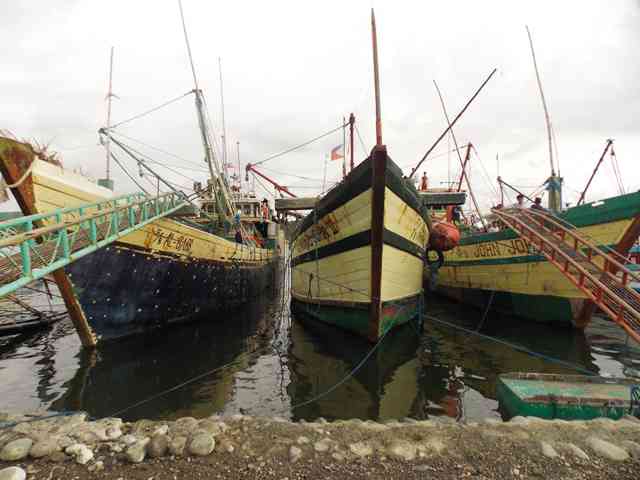Zambales surveillance system rises

FISHING boats are docked at a small fish port in Sitio Balogo in the coastal village of Inhobol in Masinloc, Zambales province. Local fishermen say they have been avoiding Scarborough Shoal for more than a year now due to the aggression of the Chinese Coast Guard. Allan Macatuno/Inquirer Central Luzon
MASINLOC, Zambales —The provincial government and a Canadian surveillance firm have started operating the provincial coast watch system (PCWS), which is capable of detecting the presence of foreign vessels in the provincial territory amid growing tension over Chinese intrusion into the West Philippine Sea.
Gov. Hermogenes Ebdane Jr. said the surveillance system had detected recently a foreign vessel attempting to enter the Zambales sea.
“During the testing of the surveillance system, our operations center was able to monitor an international ship. We challenged it, but it suddenly switched off its transponder,” Ebdane said.
Ebdane, however, declined to give details of the information the provincial government had gathered since the surveillance system was tested in March.
He said the PCWS, which was put up by Vancouver-based Xanatos Marine Ltd., had been collating information about vessel’s position, course and speed using a transponder system.
Article continues after this advertisementEbdane, in a briefing in nearby Candelaria town last week, said an operations center, which is jointly supervised by the provincial government and the Canadian firm, was set up at the provincial capitol in Iba town.
Article continues after this advertisementHe said the surveillance system was first offered to the provincial government as an initiative to protect Zambales from waste dumping into the sea by vessels entering provincial waters.
“The Canadian company would like to monitor the ecological system that exists within the vicinity of our territorial waters and this will help us protect the Zambales sea from intruding foreign vessels,” he said.
He said all information relating to national security would be relayed to concerned government agencies, such as the Philippine Coast Guard and the Philippine Navy.
Ebdane said the surveillance system was also capable of extending its monitoring beyond the Zambales sea.
In an earlier interview, he said the PCWS would also help Zambales keep track of vessels that would need to pay tariff when they docked to transact business in the province.
Ebdane said the provincial government wanted to identify every ship that entered Zambales and get information about its purpose. “If a vessel is not authorized to be here, then it will be questioned,” he said.
The provincial board cited the benefits of the surveillance system for local fishing communities and fishermen who had been harassed by Chinese Coast Guard personnel while fishing in the disputed Bajo de Masinloc, also known as Scarborough Shoal.
The provincial board, in a resolution, said Scarborough Shoal “is an ancient territory of … Zambales [that] has become one of the flash points of the territorial dispute between the Philippines and China.”
The shoal, which is some 230 kilometers away from Masinloc, serves as a refuge for fishing boats during stormy weather. It is considered a free zone for local fishermen until the Chinese began patrolling the West Philippine Sea.
Paras Liquigan, 36, a fisherman from the coastal village of Inhobol here, said Masinloc fishermen had been avoiding the shoal for more than a year now because of the aggression of Chinese Coast Guard personnel in the area.
“None of us even consider going back to the shoal anymore. Why would we risk our lives?” Liquigan said.
Amado Umayam, 54, another fisherman, said Chinese vessels had cordoned off the shoal using nylon ropes, which made it difficult for local fishermen to go near it.
“We would rather fish within our municipal waters than set off trouble in the shoal,” Umayam said.
Both Liquigan and Umayam said they would welcome whatever help, including a surveillance system, that the provincial government would provide to help them return to the shoal. Allan Macatuno, Inquirer Central Luzon